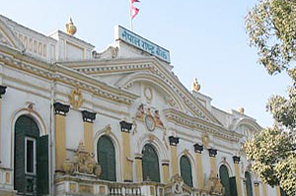NRB guvs in huddle to men matter
KATHMANDU: Former governors of central bank hold the view that the existence of a large number of commercial banks does not mean that the whole of the country has access to financial institution, since most of these banks are concentrated in urban areas.
“Only one-third of the population has access to the banking system,” they said in an interaction organised by ‘The Banker’ to welcome newly-appointed Nepal Rastra Bank governor Dr Yubaraj Khatiwada along with the central bank’s former governors.
Former Nepal Rastra Bank (NRB) governor Dipendra Purush Dhakal said very few Nepalis have access to the banking system, “so the financial sector can not be called overcrowded.”
Former governors also highlighted the problems faced by the economy right now, like liquidity crunch, higher interest rates, unchecked circulation of Indian Currency (IC) in the market, growing trade deficit and inflation.
NRB’s first governor Himalayan SJB Rana attributed the lack of knowledge among the public about Anti-Money Laundering Act as responsible for people preferring to keep cash in their own homes instead of in the bank. “The people, in general, think this is some sort of government plan to spy on them,” he said.
“Unless capital flight is contained no amount of liquidity injection will be enough,” said NRB former governor Satyendra Pyara Shrestha emphasising on the government’s support for solving present problem. “NRB alone cannot solve this problem,” he added. Another former NRB governor Dipendra Bahadur Chhetri said that NRB needs to control the rampant circulation of IC in Nepal. “However, this might be a sensitive topic.”
Former NRB governor Dr Bhesh Bahadur Thapa blamed the bad politics for the present situation of the economy. “As a result of all this, Nepal is reduced to being only a market for economically powerful neighbours,” he said. Governor Khatiwada assured that NRB is working to solve the problems but it will take some time. “NRB is also planning to monitor the banks’ spread rate as NRB has encountered lots of complaints,” he said. Earlier, speaking during the annual meeting of the development bankers, he said that NRB is keeping a hawk’s eye on some development banks and will take action soon. Pointing out the anomalies that the economy is facing, he said, “Why is it that in the age of electronic money, e-banking and mobile banking, we Nepalis and financial institutions are going back to cash? Similarly, why are we offering a single digit interest rate while inflation is in double digits?”
“Today, the formal financial sector like commercial banks has to compete with semi-formal and informal financial sectors like savings and credit cooperatives. So, these semi-formal and informal financial institutions also need to be regulated and supervised,” he added.
“When savings deposit is depleting in commercial banks day by day, NRB needs to concentrate on channelising the deposits collected by informal financial institutions to the formal one,” suggested Kumari Bank’s CEO Radhesh Pant.
Standard Chartered Bank’s CEO Sujit Mundulpointed that NRB should focus on inclusive growth and portfolio distribution of commercial banks. “The current liquidity crunch should be looked upon as an opportunity for the creation of a secondary market in Nepal,” he suggested.






